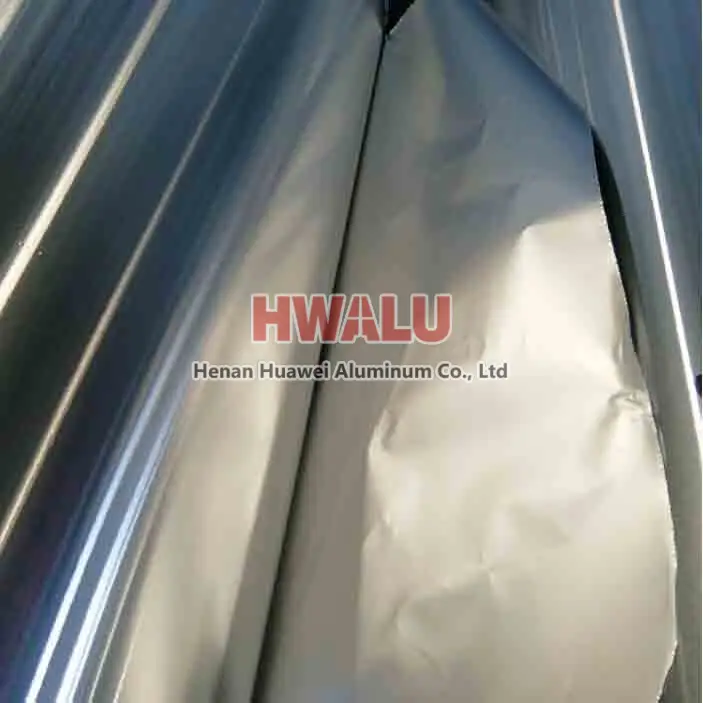Introduction: At Huawei Aluminum, we take pride in being a leading manufacturer and wholesaler of high-quality aluminum foil paper designed specifically for food containers. With a commitment to excellence and precision, our 3003 Aluminum foil is engineered to meet the highest industry standards, ensuring the safety and reliability of your food packaging. Why Choose 3003 Aluminum for Food Containers? The c ...
What is cable aluminum foil? Cable aluminum foil is a special type of aluminum foil used for cable structures. It is processed from aluminum alloy raw materials through cold rolling, hot rolling and other processes. Aluminum foil used in cables has excellent electrical conductivity and good corrosion resistance, especially in the telecommunications and electrical industries, playing an important role. 8011 ...
what is 1145 alloy aluminum foil? 1145 alloy aluminum foil and its sister alloy 1235 have a minimum aluminum content of 99.45%, and the chemical and physical properties are almost the same. Occasionally, some production batches can be double-certified for 1145 and 1235 alloys. Like 1100 aluminum alloys, both are considered commercially pure alloys with excellent formability. Due to the high aluminum content, ...
Aluminum foil alloys for food container lids Pure aluminum is a soft, light, and easy-to-process metal material with good corrosion resistance and thermal conductivity. It is often used to make the inner layer of food container lids to protect the freshness of food and prevent external contamination. In addition to pure aluminum, commonly used aluminum alloys include aluminum-silicon alloys, aluminum-magnesiu ...
What is bright aluminum foil? Bright aluminum foil is a kind of aluminum foil material with a smooth surface and good reflective properties. It is usually made of high-purity aluminum metal material through multiple precision machining processes. In the manufacturing process, aluminum metal is rolled into very thin sheets, which are then specially treated The rollers are repeatedly rolled until the surfac ...
Aluminum foil is a thin sheet of aluminum metal that has the following properties: Lightweight: Aluminum foil is very lightweight because aluminium metal itself is a lightweight material. This makes aluminum foil an ideal material during packaging and shipping. Good sealing: The surface of aluminum foil is very smooth, which can effectively prevent the penetration of oxygen, water vapor and other gases, s ...
Aluminum foil lunch box is not a new thing, but it is really the last two or three years is particularly active. In particular, the hot sealing aluminum foil lunch box, because it is the first sealed food and then high-temperature cooking disinfection, in the consumer to open the taste before the maximum ensure food safety and health, full tightness, and high barrier can also be a good lock food flavor. Even i ...
As a metal material, aluminum foil is non-toxic, tasteless, has excellent electrical conductivity and light-shielding properties, extremely high moisture resistance, gas barrier properties, and its barrier performance is incomparable and irreplaceable by any other polymer materials and vapor-deposited films. of. Perhaps it is precisely because aluminum foil is a metal material completely different from plastic, i ...
In recent years, Huawei Aluminum Co., Ltd. has set up a special research team under the condition that the aluminum foil rolling mill backing roll and the inner ring of the backing roll bearing are tight, to maintain production by repairing the scrapped backing rolls, and to ensure the normal operation of the seven aluminum foil rolling mills. During the repair process, the research team was able to repair, explo ...
In the production of double foil, the rolling of aluminum foil is divided into three processes: rough rolling, intermediate rolling, and finishing rolling. From a technological point of view, it can be roughly divided from the thickness of the rolling exit. The general method is that the exit thickness is greater than Or equal to 0.05mm is rough rolling, the exit thickness is between 0.013 and 0.05 is intermediat ...
Aluminum foil lunch box is a new type of non-toxic and environmentally friendly tableware. 1. The main ingredient in the aluminum foil lunch box is aluminum, so it will react with acid like aluminum cans, and the salt produced by aluminum and organic acids will react with gastric acid to produce aluminum chloride, so we need to use it. Note that, generally speaking, it is often used for steaming rice. There is ...






